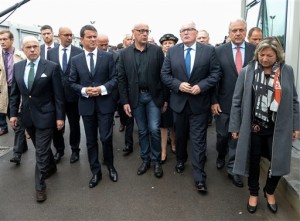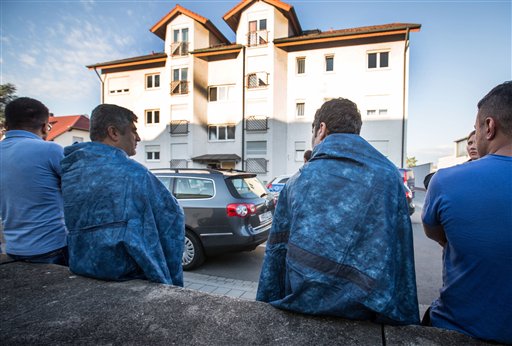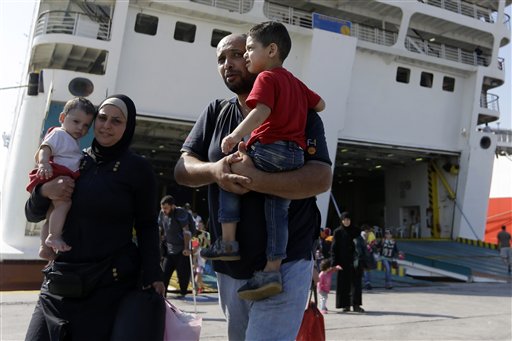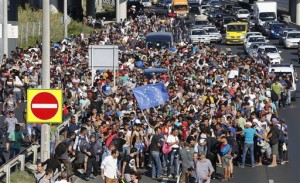The U.N. refugee agency said the United Kingdom would take a further 4,000 Syrian refugees from camps in the Middle East fleeing from their country’s war.
“We obviously welcome very much the move to increase resettlement spaces for Syrians in the U.K. Those spaces are going to be critical to the lives and future of 4,000 people,” said spokeswoman Melissa Fleming.
“We certainly believe that there’s the momentum here” for other countries to follow suit, she added.
HOW TO HELP: DONATE TO THE UNHCR
Earlier, British Prime Minister David Cameron said only that his country would accept “thousands” more people, on top of the 5,000 already announced, and would give details next week.
He also said Britain intends to take Syrians directly from refugee camps in the Middle East, not from places where they have arrived in Europe.
A spokeswoman in the 10 Downing Street press office refused to confirm or deny the figure of 4,000, saying that no specifics would be provided until next week. She declined to be identified in line with government policy.
[flagallery gid=165]
EUROPE’S MOMENT OF TRUTH
The news came as European Commission Vice President Frans Timmermans said the refugee and migrant crisis is nothing less than “a moment of truth in European history.”
Europe is staggering under an enormous surge of migrants this year, over 332,000 so far.

French Prime Minister Manuel Valls, 2nd left, walks along with French Interior Minister Bernard Cazeneuve, left, and European commissioners Frans Timmermans, 3rd right, and Dimitris Avramopoulos, 2nd right, as they visit the Channel tunnel site in Calais, northern France, Monday, Aug. 1st, 2015. (Denis Charlet/Pool Photo via AP)
Timmermans, speaking amid the chaos of arriving migrants and refugees on the Greek island of Kos, said that when it came to refugees fleeing the war in Syria, the EU and international partners, has done much less that they could have during the four years of conflict.
He said the EU is still looking for a balance between protecting those needing shelter and keeping those out who only seek economic fortune. He said the “organized solidarity” of the European welfare state “would be completely undermined if we simply say everybody can come in.”
However he added that “Europe cannot survive either if we take leave of our values and our legal obligations” for those seeking protection from persecution and war.
Meanwhile, in a joint statement, the prime ministers of the Czech Republic, Hungary, Poland and Slovakia rejected any quota system for accepting migrants in the European Union’s 28 members.
The four EU leaders said the bloc’s approach should include “preserving the voluntary nature of EU solidarity measures.” They insisted “any proposal leading to introduction of mandatory and permanent quota for solidarity measures would be unacceptable.”
IRELAND
Ireland also announced it will take in at least 1,800 refugees, tripling initial plans announced in July to accept roughly 600 over the next two years.
Justice Minister Frances Fitzgerald said Friday that a more comprehensive response is needed to the “heartbreaking and tragic” events unfolding. She said the number accepted will be “in the thousands” but that no precise figure has been determined yet.
Fitzgerald is also calling for increased aid programs and an extension of the naval search and rescue operation in the Mediterranean.
GERMANY

Residents sit in front of an accommodation for asylum seekers in Heppenheim, Germany, Friday Sept. 4, 2015. German police say they’re investigating a fire at a home for asylum seekers in the western state of Hesse in which five people were injured. (Frank Rumpenhorst/DPA via AP)
Germany is calling on European Union nations to restore a sense of unity in the face of the Europe’s worst refugee crisis since World War II.
German Foreign Minister Frank-Walter Steinmeier said Friday “we will not cope with this task if we do not stop pointing with the finger at our neighbor.” He said “blaming one another will not lead us to get the problem under control.”
Steinmeier said that “Europe cannot let itself be divided, even in the face of such a challenge.”
More than 340,000 migrants have arrived in Europe since the beginning of the year. Around 160,000 of them have entered Hungary, which blames Germany for encouraging more Syrians to apply for asylum. Germany expects to take in 800,000 migrants this year.
SPAIN
Spanish Prime Minister Mariano Rajoy says the migration influx into Europe will be the continent’s most important challenge for years and that European nations cannot refuse asylum to those who deserve it.
However Rajoy would not commit Spain to taking more than the 2,739 refugees it has pledged to accept however Deputy Prime Minister Soraya Saenz de Santamaria said Spain will probably take in more than previously announced.
His position has been criticized by opposition politicians.
Nearly a dozen new leftist Spanish town halls are working to create a network of cities to assist war refugees and say Spain should take in more migrants than the number the conservative government has agreed on.
The “refugee city” program started when Barcelona mayor Ada Colau announced the creation of a register of people who can take in or help refugees. She said Friday the city hall has received thousands offers.
Other cities such as Madrid and Valencia have followed suit. Madrid mayor Manuela Carmena promised to dedicate 10 million euros ($11 million) to the project.
HUNGARY
Hundreds of migrants have broken through a Hungarian riot police cordon at the Bicske train station, running westward on a train track and interrupting train traffic.
Surprised riot police scrambled for their helmets Friday as the huge crowd suddenly surged from the front of the train, site of a day-long standoff. Police pushed some migrants back onto the train amid much shouting, screaming and infants crying but were only able to block a minority of the estimated 500 people there.

A young boy holds on to a fence outside of a train that was stopped in Bicske, Hungary, Friday, Sept. 4, 2015. Over 150,000 migrants have reached Hungary this year, most coming through the southern border with Serbia. Many apply for asylum but quickly try to leave for richer EU countries. (AP Photo/Petr David Josek)
An Associated Press reporter saw at least 200 migrants, probably more, running in a wide group along the railway line west of Bicske, heading for Austria 135 kilometers (84 miles) away. The migrants had refused police demands to go to a processing center.
Hundreds of frustrated migrants are now marching from Budapest to the Austrian border by foot.
Carrying bags and backpacks, they snaked through Budapest in a line nearly a half-mile long, hampering traffic at times, as they began the 171-kilometer (106-mile) journey to Austria.
The people, many Syrians fleeing war, want to eventually reach Germany or elsewhere in the West and are trying to avoid registering in economically depressed Hungary, which is more likely to return them to their home countries.
The German government has declined to offer advice to Hungary on how to deal with migrants who refuse to be registered at camps there.
Government spokesman Steffen Seibert said Friday he “can’t give any recommendations to the Hungarian authorities or anyone else in the absence of precise knowledge of the situation in and around Budapest.”
Refugees are trying to avoid Hungarian camps because they don’t want to pursue asylum claims there. Hungary says the influx is Germany’s problem because most want to go to Germany.
Seibert reiterated Berlin’s position that a pan-European response is required. He noted Budapest’s obligation to register, process and take care of migrants and said Germany “assumes that Hungary, as part of the Western community of values, will do justice to its legal and humanitarian obligations.”
GREECE

A family arrives from the northeastern Greek island of Lesbos to the Athens port of Piraeus, Friday, Sept. 4, 2015. About 2,500 people arrived on the ferry Eleftherios Venizelos. (AP Photo/Thanassis Stavrakis)
Amnesty International says angry Greeks brandishing bats attacked migrants on the island of Kos shouting “Go back to your countries!” — and that Greek police did not intervene quickly enough.
The rights group is urging Greek and European authorities to swiftly improve the “hellish” conditions faced by thousands of migrants awaiting screening on the eastern Aegean Sea island.
The rights group says up to 4,000 migrants are on Kos, which they reach in small boats from nearby Turkey, and the situation is dire. The island has no reception center so many sleep out in the open with little food or water.
EU Migration Commissioner Dimitris Avramopoulos said Friday on a visit to Kos that a fast-track processing center will be set up at Greece’s main port of Piraeus, near Athens, where European teams will quickly fingerprint and process migrants.
The center will determine who among those arriving is a refugee fleeing persecution or war and therefore entitled to asylum in Europe, and who is an economic migrant, who will be sent home.
Meanwhile, the mayor of the eastern Aegean island of Lesbos is appealing for “immediate measures” to help alleviate the acute refugee and migrant crisis on his island, which is the entry point for about half of the hundreds of thousands who have arrived in Greece so far this year.
Spyros Galinos described the situation as a bomb about to explode in his hands. “I appeal to the prime minister for immediate measures,” he told state television Friday. “We will have victims.”
Earlier Friday, clashes broke out between police and about 1,000 people, mostly Afghans, who attempted to rush onto a ferry heading to Greece’s main port of Piraeus, near Athens. Police fired stun grenades to repel the stone-throwing crowd.
Galinos said there were currently about 15,000 refugees and migrants on his island, of whom 7,000-8,000 were already registered and waiting to leave Lesbos for Athens but were unable to find ferry tickets due to fully booked ships. The government has chartered two ferries to transport the migrants, but with thousands of new arrivals each day, they have not been enough.
Galinos said he had proposed extra ferries as well as charter flights to defuse the overcrowding on the island. “I don’t need one ship, I need a fleet,” he said.
Greece’s coast guard says it has rescued hundreds of refugees and migrants from the sea near the eastern Aegean islands, a daily occurrence as hundreds of thousands flee war and poverty in the Middle East, Africa and Asia toward Europe.
The coast guard said it picked up 535 people in 12 incidents off the islands of Lesbos, Samos, Agathonissi, Kalolymnos and Kos from Thursday morning to Friday morning. That doesn’t include hundreds who make it to the islands from the nearby Turkish coast themselves.
Greece’s eastern islands have been overwhelmed by the massive influx, and ferry tickets to the mainland have been scarce during the tourist season. Scuffles broke out with police at Lesbos port Friday when about 1,000 people tried to rush onto a ferry to Piraeus, local media reported.
Story by the Associated Press
 CGTN America
CGTN America Migrants walk out of Budapest, Hungary, Friday, Sept. 4, 2015. Over 150,000 people seeking to enter Europe have reached Hungary this year, most coming through the southern border with Serbia, and many apply for asylum but quickly try to leave for richer EU countries. (AP Photo/Frank Augstein)
Migrants walk out of Budapest, Hungary, Friday, Sept. 4, 2015. Over 150,000 people seeking to enter Europe have reached Hungary this year, most coming through the southern border with Serbia, and many apply for asylum but quickly try to leave for richer EU countries. (AP Photo/Frank Augstein)
